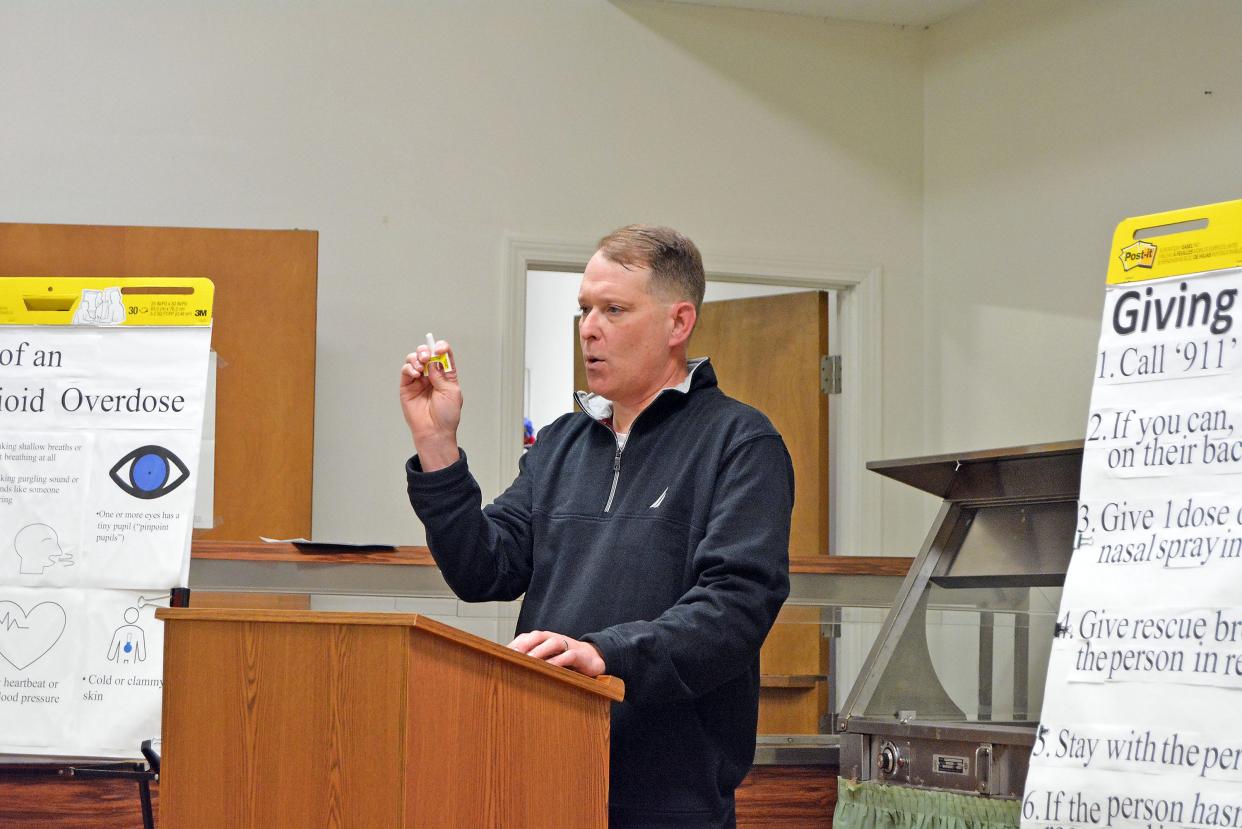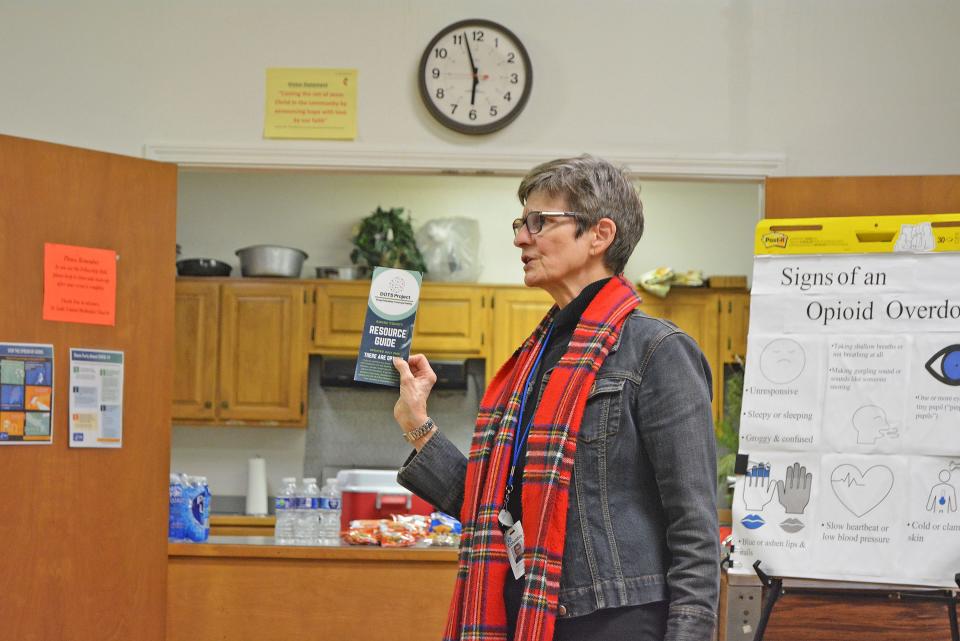Narcan distribution aims to save community lives from opioid overdoses

Fentanyl can be laced into any street-purchased drug, including marijuana, potentially leading to an opioid-related overdose or death.
That was the message Columbia/Boone County Public Health and Human Services Health Educators Dave Zellmer and Heather Harlan aimed to impart to about a dozen guests of a Narcan, generic name Naloxone, distribution and demonstration Thursday at St. Luke's United Methodist Church.
The health department has partnered with the Boone County Overdose Response Coalition for the distribution of this nasal spray medicine that counteracts opioid overdose. Regular distribution events are planned. The first took place last month at the health department.
A lethal dose of fentanyl, a synthetic opioid, is equivalent to about 10-15 grains of salt. There were 25 suspected or confirmed overdose deaths in Boone County between January and October 2022. That number was 30 in 2021 and 18 in 2020.
More: Columbia health officials want you to carry Narcan. Here's why and how to use it
"In 2021 in the state of Missouri, 1,617 people lost their lives to an opioid overdose," Zellmer said, comparing this to a full 737 plane crashing once per month for the calendar year. "If that were the case, it would be on the news all the time."
Opioids attach to nerve receptors and make the brain think a person is not experiencing any pain. Opioids like Vicodin were developed in the 1970s, eventually being deemed safe a decade later, but without much research on dependency and tolerance leading to higher dosages and addictions.
"What happens is when you relieve some of that pain, it is a euphoric experience, and it is that euphoria what has caused opioids to spill into the recreational drug scene," Zellmer said.
Columbia parent Rebecca Harris attended the distribution with her teenage sons for her and their own education, she said.
"I have heard a lot about fentanyl and kids dying from it. I want to make sure my sons are safe and they know what to do," she said.
Administering Narcan
The signs of an opioid overdose are someone who is unresponsive, slow or a lack of breathing, a gurgling sound that may sound like snoring; blue lips and nails in fair-skinned people or ashen in people of color; cold and clammy skin; or pinprick pupils.
For those with friends or family, or who may come across someone experiencing an overdose, call 911 right away.
A vigorous sternum rub in an unresponsive person can be an indicator of an opioid overdose, Zellmer said. Those possibly overdosing on a different drug will have a response. With an opioid, a person will not.
If you have access to Narcan and it is expired, administer it anyway. The medicine can have effectiveness past an expiration. It also is a good idea to administer to a person with a suspected overdose even if the overdose is not an opioid. While Narcan will not affect stimulant overdoses like methamphetamine, it could have been adulterated with an opioid, which Narcan will treat.
When in doubt, give Narcan. That was the message Zellmer and Harlan had.
Once administered, stay with the person and wait two to three minutes before administering another dose. It takes about that time for Narcan to take effect. Multiple doses can be administered, so long as there is a wait time between dosages.
It also is recommended to administer rescue breaths, if necessary or if advised by a 911 dispatcher, as well as putting a person on their side in the recovery position, so as to keep airways clear.
Narcan stays in the body for about 60 to 90 minutes, so do not leave the person who overdosed alone, as they can revert to an overdose once the Narcan has subsided.
Where to get Narcan; other resources
Opioid overdoses disproportionately affect Black communities. Most related deaths happen in the home and in Boone County the number of overdose deaths more than tripled from 2019 to 2020 for those aged 35 to 44.
From 2021: Half of this year's drug overdose deaths recorded in Columbia have occurred since Aug. 1
Narcan can be accessed at the health department without insurance or at pharmacies if a person has insurance or Medicaid. A prescription is not necessary, but insurance and pharmacies may have specific policies related to Narcan acquisition, Zellmer said. Calling a pharmacy first is recommended.

Do not keep Narcan in a vehicle because it is sensitive to temperature extremes.
Each person who received a box of Narcan on Thursday also received an information pamphlet on other community resources for substance use treatment.
"Medication works on one part of the brain and counseling works on another part," Harlan said, adding a couple more resources are calling 988 for people experiencing a mental health crisis or calling 1-800-395-2132 to get a peer recovery coach for those experiencing substance use issues.
"A peer recovery coach is someone who has had life experience, has been where that person is and has had professional training," she said. "They can give you help and manage how to get into treatment."
The health department also is offering training known as the "School of Hard Talks" through Zoom. It is a no-cost program for adults to learn communication and conversation skills when interacting with adolescent or adult loved ones living with mental health conditions or substance use issues.
There is limited enrollment for the four, 2-hour meetings. People can register by calling Harlan at 573-874-2489 or emailing heather.harlan@como.gov or monica.stokes@como.gov.
"Sometimes as family members, we are not very good at communicating and we are trying to control a situation we cannot control," Harlan said, adding it also is known as motivational interviewing for loved ones, or MILO.
Charles Dunlap covers local government, community stories and other general subjects for the Tribune. You can reach him at cdunlap@columbiatribune.com or @CD_CDT on Twitter. Subscribe to support vital local journalism.
This article originally appeared on Columbia Daily Tribune: Narcan distribution events aim to reduce opioid overdose deaths

